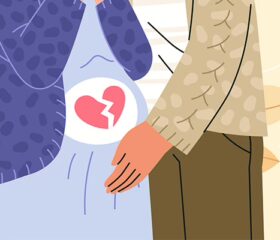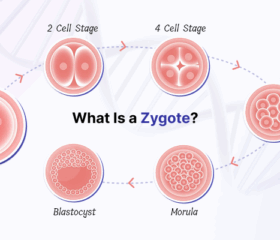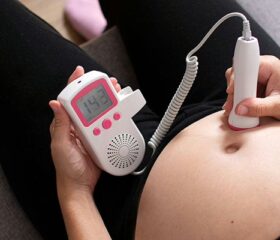What Happens After a Miscarriage and How to Cope
Losing a pregnancy is one of the most heartbreaking experiences any soon-to-be mom can go through, but there’s a path forward.

Whether you’ve been trying for a baby for a while or your pregnancy was a happy surprise, if you’ve experienced a miscarriage, your grief is justified. That’s the case no matter what stage of pregnancy you were at.
Know that you’re not alone. About 15%–20% of pregnancies end in miscarriage, and it’s believed that the number might actually be higher due to unreported cases. 1 2
Read on for practical advice that will help you process your loss and recover a semblance of normality after a miscarriage.
What is a miscarriage?
A miscarriage is the sudden loss of pregnancy during the first 20 weeks of gestation. Typical signs of a miscarriage include:
- Lower back pain
- Abdominal cramps
- Vaginal bleeding
You might also see vaginal discharge resembling blood clots or whitish tissue. If so, this will end 2 to 4 hours after the bleeding and cramps begin.
The pain usually tapers off within the day as well. However, you might still experience light bleeding for up to 6 weeks after your initial symptoms. 3 4
If you experience any of these symptoms, contact your doctor immediately.
What to expect after a miscarriage diagnosis
After your doctor confirms a pregnancy loss (usually with an ultrasound), they’ll first ensure that your body passes all the pregnancy tissue from your uterus.
Any tissue remaining in your uterus can get infected. You might also be at risk of heavy bleeding (which can lead to anemia), pelvic pain, and a build-up of uterine or cervical scarring. 4 5
Your doctor will use one of three treatment methods depending on the type of miscarriage you experience:
Expectant management
If you and your doctor decide on expectant management, you’ll let your body try to pass the pregnancy naturally (without any medication to induce the process or surgery).
You might feel some pain while you wait, in which case you can take over-the-counter pain relievers like acetaminophen (paracetamol) and ibuprofen. 6
Consult with your doctor if you experience severe and prolonged pain, if your bleeding gets heavier (saturating a large pad within 1 to 2 hours), or if the symptoms last for a few hours or more. 7
Medication
If your body retains some of the pregnancy tissue, your doctor may prescribe medications, such as misoprostol (also known as “Cytotec”), to induce contractions so your uterus can empty itself.
You can take misoprostol orally or vaginally, and you may have side effects such as: 8
- Dizziness
- Bleeding
- Cramping
- Nausea and vomiting
- Diarrhea
- Temporary flushes or sweats
- Headaches
Surgical intervention
Many women who go through a miscarriage require a surgical procedure known as dilation and curettage (D&C).
If your pregnancy loss happens after week 10 of your pregnancy, you’re more likely to undergo this treatment, during which your doctor will clear your uterus of any fetal and placental tissue.
The procedure is usually painless since your doctor will administer a form of anesthesia. For your safety, it’s best not to drive yourself home afterward, as the medication may make you drowsy or impair your senses.
After your treatment, you may have light spotting and cramping for a few days. 9
What are the physical effects of a miscarriage on your body?
Miscarriage takes a toll, and it may take a while for you to fully recover physically.
You may have to contend with:
- Bleeding: As mentioned, each treatment option comes with a risk of bleeding. See your doctor if you soak your pad within 2–3 hours and if your discharge smells foul. 10
- Cramping: You’ll experience cramping as your body expels the fetal tissue. You can use over-the-counter pain relievers to manage physical pain, alongside heating pads. 11
- Breast pain or tenderness: Your breasts may feel sore and start to leak. You can manage these symptoms with ice packs, supportive bras, and breast pads. Avoid any breast or nipple stimulation. 10
- Infections: Keep an eye out for signs of infection, including heavy bleeding, foul-smelling discharge, fever, chills, and severe abdominal pain. To minimize your risk, avoid douching (which is never recommended, anyway), vaginal sex, tampons, or menstrual cups until your body recovers. 3
Your doctor will schedule a checkup a few weeks after your miscarriage to assess your recovery progress and discuss any concerns. You may also need to get a blood test several weeks after losing your pregnancy, but that depends on your circumstances, and it’s also possible your doctor won’t order one. 10
Your menstrual cycle after miscarriage
It takes time for your body to heal. Depending on how far along you were in your pregnancy, it may take 4 to 8 weeks for your menstrual cycle to return. 12
As your body recovers, you may notice your period is slightly different than before. Due to hormonal changes, it might last longer than usual, and your flow might be heavier. The opposite is also true: your period could be shorter and your flow lighter.
If your period remains irregular for 3 to 6 months afterward, consult your doctor or OB-GYN. 12
When can you resume normal activities?
It’s normal to want everything to go back to normal after a loss as traumatic as a miscarriage. However, take your doctor’s advice about what you should and shouldn’t do.
It’s best to avoid activities that introduce foreign objects or substances into your vagina, like using feminine sprays and tampons or having sex.
Your personal hygiene is paramount when it comes to preventing infections. Take a shower at least once a day during the first week after your miscarriage. While you’re still bleeding and vulnerable to bacteria, avoid baths, hot tubs, and swimming pools. 13
You should also lay off any strenuous physical activities, like vigorous exercise or lifting and pushing heavy objects, for at least 2 weeks. 13
How to deal with the emotional aftereffects of miscarriage
Of course, miscarriage takes a toll on your mental well-being, and it may take you much longer to heal emotionally than physically. Your world just fundamentally changed, and there’s no right or wrong way to feel.
While you work on your physical health, you’ll also need to go through the grieving process.
The stages of grief
As with any loss, you may pass through five stages of grief after your miscarriage:
- Shock and denial: Your initial response may manifest as numbness, confusion, dizziness, and disbelief. You might be convinced that your healthcare providers made a mistake and that this couldn’t have possibly happened to you.
- Anger and guilt: It might feel like there’s someone to blame. You might feel betrayed by your own body, your doctor, your loved ones, or even a higher power. It’s natural to feel anger and guilt.
- Bargaining: You might wonder what you could have done differently to prevent this. Remember that pregnancy complications and miscarriage can happen to anyone.
- Depression: This stage manifests as sadness, helplessness, and sometimes despair. It’s also a natural part of the grieving process, and doesn’t mean you’ll become clinically depressed.
- Acceptance: You might not ever forget what happened, but eventually, you can work your way towards coming to terms with your loss.
These are stages, not steps. It’s normal to cycle back and forth through the different stages as you heal, and it’s also possible you’ll skip some entirely.
Don’t shy away from your emotions. Whether you’re sad, angry, confused, relieved, or even jealous towards other parents, don’t ignore it. It’s difficult, and it’s OK to cry.
Be aware of your triggers
If you were actively searching online about pregnancy, you may get shown a lot of related content. Try blocking pregnancy hashtags on social media and using your settings to change what kinds of ads you see. 14 It’s also normal to be triggered by events like baby showers, gender reveals, funerals, or even family reunions. Give yourself some time and space away until you feel comfortable.
How to move forward after a miscarriage
In the aftermath of a miscarriage, you should prioritize your physical and emotional well-being. Here’s how to do that.
Set boundaries
Sometimes, well-meaning friends and family may cross the line when trying to comfort you. They may say things that downplay your experience, belittle your feelings, and rush you into “getting over it” before you’re ready.
It’s okay to stand up for yourself or walk away from unproductive conversations, especially if you’ve already made it clear that you don’t appreciate their comments.
Seek support
Sharing your feelings with your loved ones helps you process your grief. Moreover, your partner, family, and friends may be grieving, too. Open communication gives you all a safe space to work through the emotional turmoil.
You don’t have to deal with a miscarriage alone. Many organizations offer support and information for individuals and families who have lost a pregnancy.
Share Pregnancy & Infant Loss Support provides counseling and educational resources for those dealing with a miscarriage. You can also check out Return to Zero (RTZ) H.O.P.E., which provides online support for women in this situation.
Memorialize your loss
It’s natural not to want to be reminded of your baby’s absence, and you may want to throw away any clothing or toys you might have purchased. However, it’s important to also give yourself a way to honor your baby.
Hold a small memorial or ceremony, donate your baby’s belongings to a charitable organization, or find any other way to memorialize your baby and come to terms with your loss.
Talk about the miscarriage with your other children (if you have any)
If you have other children, it’s important to have an honest conversation with them about what happened. This may be hard, but it’s necessary. Make sure to tailor your language to their age and allow them to express their own feelings.
When can you try to conceive again?
Your body and mind need time to deal with the trauma of a miscarriage, so if you’re thinking about trying again, try not to rush into it.
You should wait 3 to 6 months for your body to heal and your menstrual cycle to get back on track. 15
You may not feel ready right away, and that’s okay. Give yourself the time you need to heal and make the best decision for your future.
Does having one miscarriage mean you’re more likely to have another?
After one miscarriage, you have a 25% likelihood of experiencing another one, which is only slightly higher than someone who has never miscarried before. 16
After a second and third miscarriage, your risk of another one increases to 30% and 40%, respectively. However, less than 1% of women will experience three consecutive losses. 17
Final thoughts
A miscarriage can leave deep emotional scars that may take years to heal (and they may never heal completely, which is also OK).
Know that miscarriages can happen to any expectant mother, so try not to blame yourself.
Give yourself time to grieve, and don’t hesitate to reach out to your support network or one of the miscarriage support organizations mentioned above.
Article Sources
- Harvard Health Publishing. "Miscarriage" Retrieved October 29, 2025.
- Women & Infants Fertility Center. "Recurrent Miscarriage and Pregnancy Loss" Retrieved October 29, 2025.
- American College of Obstetricians & Gynecologists. "What Happens After a Miscarriage? An Ob-Gyn Discusses the Options." Retrieved October 29, 2025.
- MedlinePlus. "Miscarriage" Retrieved October 29, 2025.
- Cleveland Clinic. "Retained Products of Conception" Retrieved October 29, 2025.
- Pregnancy, Birth and Baby. "What is natural management of miscarriage?" Retrieved October 29, 2025.
- Women’s & Children’s Hospital. "Expectant Management of Miscarriage" Retrieved October 29, 2025.
- British Pregnancy Advisory Service. "Medical Miscarriage management" Retrieved October 29, 2025.
- John Hopkins Medicine. "Dilation and Curettage (D and C)" Retrieved October 29, 2025.
- Iowa Health Care. "Miscarriage Care Instructions–Expectant Management" Retrieved October 29, 2025.
- UC Davis Health. "What you should know about miscarriage signs, early miscarriage and more" Retrieved October 29, 2025.
- Miscarriage Association. "Periods after pregnancy loss – what to expect" Retrieved October 29, 2025.
- UAMS Health. "Caring for Yourself After Loss" Retrieved October 29, 2025.
- Tommy’s. "How to stop pregnancy ads following you after a loss (retrieved from archive.org)" Retrieved October 29, 2025.
- University of Utah Health. "How Soon Can You Safely Try for Pregnancy after a Miscarriage?" Retrieved October 29, 2025.
- Cleveland Clinic. "Miscarriage" Retrieved October 29, 2025.
- Texas Children’s. "Coping after a miscarriage and pregnancy loss" Retrieved October 29, 2025.







